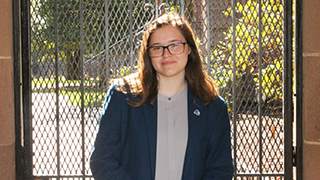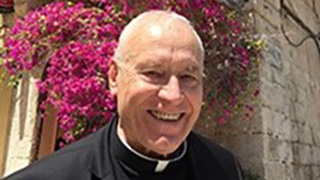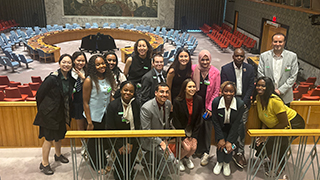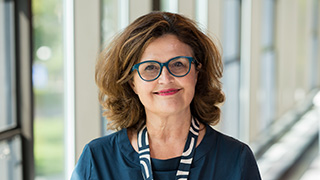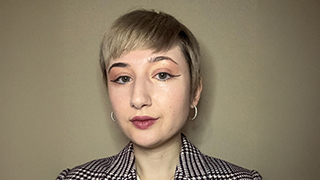Global Conversation at Seton Hall: UNGA President Yang Meets With Future Leaders
Friday, May 2, 2025
On April 16, Seton Hall, School of Diplomacy and International Relations, hosted His Excellency, Ambassador Philemon Yang, president of the 79th Session of the United Nations General Assembly, at the World Leaders Forum. This marked a historical moment at Seton Hall, bringing together future leaders and the president of the UNGA.
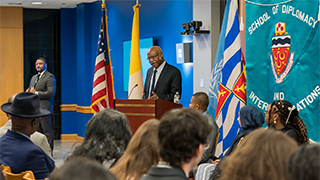
The World Leaders Forum (WLF) is an inspiring speaker series held since 1999, aiming to bring together Diplomacy students with inspiring leaders in world affairs. Throughout its history, the WLF has hosted many prominent leaders, including UN Secretary-General Kofi Annan, Former Prime Minister of Israel Shimon Peres, Former President of the Soviet Union Mikhail Gorbachev, United States Ambassador to the United Nations Linda Thomas-Greenfield and others. The WLF is a traditional signature program that makes Seton Hall's School of Diplomacy unique.
Hosted in the Chancellor’s Suite of the University Center, the WLF brought together students, faculty and distinguished guests from the field of diplomacy. The atmosphere blended the excitement among students with their hope for the future. Madeline Rowe, a Diplomacy and International Relations undergraduate student, shared her excitement about welcoming President Yang. ''Over the past couple of years, WLF hosted several officials from the United Nations. I am excited to hear where President Yang overlaps with them and his insights on current international diplomacy.''
The morning began with an opening speech by Dean Courtney Smith, Ph.D., who reflected on the School of Diplomacy’s long-standing commitment to the UN Community and the desire to prepare students to build peace and social justice. Following Dean Smith, Jehangir Khan, Secretary General of the UN Council of Presidents of the General Assembly (UNCPGA), approached the podium to introduce President Yang.
Khan’s remarks specifically emphasized the School of Diplomacy's association and collaboration with the UN. ''Seton Hall is contributing to the United Nations agenda and to strengthening multilateralism,'' Khan noted. He went on to introduce President Yang, highlighting the UNPGA’s impactful diplomatic career and the General Assembly’s recent adoption of the "Pact For The Future," which Yang has prioritized to implement during his administration.
Following Khan’s address, President Yang stepped to the podium for his keynote address:
Distinguished Faculty,
Dear Students,
Ladies and gentlemen,
I am honored to join you today at the World Leaders Forum. You are as the future diplomats,
leaders and thinkers who will shape our world.
President Yang continued his speech highlighting the three pillars of the United Nations: Peace and Security, Sustainable Development and Human Rights. He acknowledged the importance of the General Assembly as the most representative, deliberative body of the organization, which has 193 member states. In his compelling address, he noted the optimism he holds towards a better world.
The nations of the world and international organizations must reflect and think properly. We must uphold the principles of the United Nations Charter and respect international law. We must respect and promote human rights and human dignity. We must push forward everything we can do to achieve the Sustainable Development Goals. And to all this, we seek solutions through diplomacy and dialogue.
President Yang emphasized the need for the "Pact for The Future," adopted by world leaders in September 2024 and by heads of state and government in New York. Throughout his speech, he urged member states to play a greater role in the implementation of this pact, which offers a shared vision for a multilateral system that is more just, more inclusive, and more effective. He shared that The Pact for the Future presents a multilateral system that upholds peace, respects human dignity, and drives transformative action for the achievement of the world.
He concluded his speech with a powerful reminder of the responsibilities and possibilities that the current generation of students can hold: ''You are not just observers of global affairs. You are contributors, and in many cases, practitioners. Armed with your critical thinking and ambition to serve, you bring the energy that this world system urgently needs. This session of the General Assembly has opened space to confront the world’s hardest challenges. Your task is to keep that space open — and fill it with ideas that are bold, practical and inclusive.''
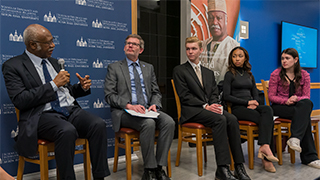
World Leaders Forum Student Panel
Students had the chance to interact with President Yang during the address's Q&A section. During the student panel, Trenton Stevens, Diplomacy and International Relations undergraduate student, asked; ''How do you envision fostering unity on a global scale, especially in times of increasing polarization?'' President Yang’s response reflected upon the theme of “cooperation.” He reminded the audience that unity on a global scale already started in a regional and global context by emphasizing the effort of the European Union, the United Nations, and other international organizations to come together and speak rather than fight. ''We are not in heaven, but we are not in hell either,'' he said. President Yang’s address sparked deep reflection on the power of diplomacy and negotiation, particularly among students and other audiences.
Among other student panelists, Nicholas Kimble posed a critical question; ''Under your tenure, how would you like to see the UN Security Council reformed?'' In response, President Yang again noted the importance of Pact for the Future, which was adopted by consensus in the UNGA, ''Pact for the Future draws one conclusion, that the UN Security Council requires reform.'' President Yang went on to highlight the recent progress on the negotiations with member states and the optimism he holds. He noted the importance of equitable representation and the geopolitical reality of today’s world.
The latest World Leaders Forum concluded, and many audience members left with a clear sense of optimism for the world’s future. President Yang’s speech reaffirmed the essential truth that there is nothing diplomacy cannot solve. Dialogue, respect and cooperation remain keystones for achieving global peace and security.
Diplomacy and International Relations graduate student, Ousmane Dansoko, described the day as diplomatically and academically motivating. ''Today was a historical day for partnership between Seton Hall University and the United Nations,'' Dansoko said. ''This is fundamental for all students to be able to be inspired by UN officials to build a better future. It was a great honor to meet and hear directly from His Excellency President Yang and getting to know his enduring vision of positivity for international diplomacy and multilateralism.''
The World Leaders Forum brings officials from the field of international affairs to the campus where present and future directly engage, inspire and discover from each other. WLF not only serves as an academic experience but also as an active demonstration of the essential qualities that world diplomacy demands. The WLF aims to prepare Seton Hall students to engage with world-level policymakers, leaders, and advocates as part of their career development and preparation for a bright future.
Categories: Nation and World


